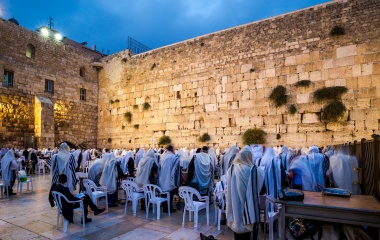
“And when you reap the harvest of your land, you shall not reap all the way to the edges of your field, or gather the gleanings of your harvest; you shall leave them for the poor and the stranger: I am your G-d” (Vayikra 23: 22). This verse appears precisely in the middle of the Torah’s description of the Biblical holidays. Not only is this verse seemingly out of context, it is completely superfluous. Just four chapters earlier, in the Torah portion we read last week, the Torah tells us “When you reap the harvest of your land, you shall not reap all the way to the edges of your field, or gather the gleanings of your harvest… you shall leave them for the poor and the stranger.”(Vayikra 19:9-10)
Contrary to what is often thought, the Torah is not averse to repeating itself. While oftentimes the repetition adds additional insight and nuance, often the primary purpose is no more and no less that to stress the importance of a particular law. When something is important one repeats the message over and over again. Hence “36 – and some say 46 – times the Torah commands us [not to mistreat the] ger”, the stranger and/or convert (Bava Metzia 59b). It does so because this is something very, very important. As the Torah explains over and over again this is due to the fact that we were slaves in the land of Egypt. We know what it is like to be mistreated and we dare not do so to others.
Leket and Peah are so important as to what it means to be a Jew that the Torah repeated the command a mere 130 verses later. So important are these mitzvot that they are amongst the very few the Talmud says must be taught to a potential convert [1]. And it is these mitzvot that paved the way for the Davidic and hence the messianic dynasty. Who know if Rut and Naomi could have survived if not for these mitzvot? It was Boaz’s generosity and insistence that a Moabite woman be allowed to glean from his field that led to the birth of King David.
Undoubtedly, the Sages had this in mind when they taught “what reason had Scripture to place these laws amidst those regarding the festival-sacrifices — those of Pesach and Shavuot on this side of it, and those of the New Year, Day of Atonement and Sukkot following on that side of it? To teach you that he who leaves the gleanings, the forgotten sheaf and the corner of the field to the poor as it ought to be, is regarded as though he had built the Temple and offered his sacrifices therein”. It was King David, born only because Boaz fulfilled these mitzvot, who laid the groundwork for the building of the Temple and his son Shlomo – the great-great grandson of Rut and Boaz - who actually build the Temple.
Our Sages were teaching more than history; they were teaching how a small act of kindness can reverberate for generations and literally change the world.
At the same time they were teaching what the purpose of the Temple was. The Temple was a house of prayer – “for My house is a house of prayer for all nations” (Yishayahu 56:7) and a place to offer sacrifices. But much more important it was a place where the Jewish community was to come together. It was the place we were to be inspired to help others. One cannot offer sacrifices to G-d unless one helps those in need. Doing so would miss the entire point of a korban, of trying to come closer to G-d. One can only do so by coming closer to man.
And this is the message of the holidays. We eat matza to remind us of slavery and to ensure we don’t enslave others, we share our crops as we celebrate Shavuot, the sound of the shofar must awaken us from our slumber, to alert us that there is so much do to make this world a better place. We fast on Yom Kippur to sensitize us to the needs of the hungry by getting a taste of what it is like to hungry, and leave our homes on Sukkot to sensitize us to the needs of the homeless by gaining a modicum of understanding of what it means to not have a roof over one’s head and we rejoice on all our holidays with the “stranger, the widow and the orphan [2]”.
The placement of leket and peah are not out of context at all. They are exactly where they belong teaching us the purpose of the holidays.
[1] The other mitzvot the Gemara instructs we teach the potential convert are the related mitzvot of shichicah, the obligation to leave for the poor that which one had forgotten to harvest, and maaser ani, the obligation to give 10% of one’s produce to the poor. The only other mitzvot one must teach – and the only ones that have a “ritual” component – are Shabbat and kashrut.
[2] The listing of the holidays actually begins with the command to (once again) work for six days and then observe shabbat. And as it says in the Ten Commandments we are to observe shabbat to remind ourselves that we were slaves in Egypt” – and we dare not enslave others.



